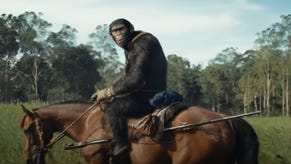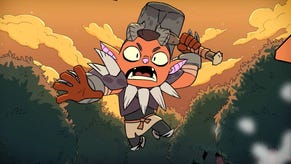Bleszinski: "AAA is not dying" - full GDC session report
Epic design boss Cliff Bleszinski gave his much-anticipated GDC talk earlier today, giving insight into PR, marketing, team-building and how to deal with the "f**king assholes" of the internet.
Bleszinski started off his talk at GDC today chatting about how he got into the business with Jazz Jackrabbit.
The Epic frontman then went on to talk about all the games he and Epic are famous for; advised his talk is his personal opinion and not that of his publisher; and told a story about losing his GDC badge to the benefit of a homeless man.
The value of good colleagues
Cliff chatted about being "power creative"; the value of marketing and PR; how to assess yourself and know your weaknesses; and how to find the right people to work with you who can make up for your downsides.
He said you really need a team, as he has at Epic, who will give you s**t when you need it, and be honest with you and edit you when needed.
You have to know your weaknesses; know when to let go and delegate; have left and right brain types at your company; and a team that compliments you as a leader.
Bleszinski said you also need to make your products personal. Gaming is an art - no need to argue about it, he said, and there is not enough of it in the industry. Miyamoto was an inspiration to the developer.
Marcus had daddy issues in the first Gears game, because both Cliff and Rod Fergusson lost their fathers at a young age - again, he said, make your games personal; yield to your interests and use them in you creations.
Designing games is a "soft sale". Designing games is one part sales - you have to convince those around you that you have a good idea. To get your peers excited is important, because if they're not, then you won't be able to sell it to the press or the publisher, let alone the public.
The power and pitfalls of PR
Cliff said PR is very important when developing yourself as a "power creative". PR is necessary, not nice. Be public with yourself, he advised, and commented that the reason developers don't do PR is because "we are all f**king assholes," to much laughter.
Bleszinski pointed at the crowd when he said "we," and was actually talking about internet trolls. He's called out PC Gamer on this in a tweet for claiming he said, "Game developers are assholes." The site's now apologised: as you can hear in the audio clip there, he literally doesn't say that at all.
He then read off some of the derogatory comments made about him and Tanya Jessen, the producer for Bulletstorm, on various forums.
You have to have thick skin, he said, as it is better to "be loved and hated than ignored."
Cliff said most publishers do not want developers doing PR because they consider them cogs in the machine, but said it is important to get out there and get yourself known, because it is good for your product.
You are the face of the company, so be humble. You are the rockstar, yet you need to be the lead singer and make sure the rest of the band is involved.
Cliff said few developers get involved with marketing, but they should - the game is their baby, and creators should have a vested interest in it.
As the keyholder to an IP, he advised, you need to lift your head from building the game and have more input into the box art; the copy; the logo and symbols; TV ads and even viral campaigns.
If you are going to be a power creative, Cliff said, you need to understand the shifting mind of the consumer. He noted The Shallows by Nicolas Carr. You have to understand their multitasking minds and the constant connectivity of social networking, instant messaging, tweeting and texting.
He used games media figure Geoff Keighley as an example of a person texting on two Blackberries at once yet can hear every word you tell him and even repeat it.
"AAA is not dying, I am tired of hearing that."
Building strong games
So, how are designers supposed to adjust to this? By making an IP that is open, friendly, split-screen without two rendering views, Cliff explained.
This is how you get players' attention, Cliff claimed. He advised developers be surgical with players, and reward early, often and long term with "cookies, achievements," and other goodies.
He mentioned that trick pricing, time commitment, "freemium and snack" gaming helps, because customers are scared to pay $60 for a game any more - but they will play for free.
"AAA is not dying, I am tired of hearing that," said Cliff, adding that you need to get gamers to marry your game and not just date it.
Cliff said the "middle class game" is dead, because gamers are cautious now.
The designer claimed that names are important when creating a game world. He suggested only 1-2 percent of new IPs succeed, and that to do so, you have to make the world something to keep the community interested in. You can't burn then on a $60 game, he warned, or they will go back to what they are familiar with and not try new IPs.
Cliff said the best game features are "trifectas," which show off engine, story, and gameplay in one hit.
Parting Advice
Cliff cited a ten year rule, advising developers to stay mysterious, but also suggested bringing back older mechanisms and properties for younger gamers.
He said narrative and context must be made to matter.
Always remember, he cautioned, that creating a game is a business, and a for-profit one. It can be confusing, so learn it and study it, he said, adding that designers should get an agent - and even a lawyer.
Cliff was critical of pre-orders as a sales metric, saying a new aggregate is needed.
He warned against stagnation, which he says kills innovation, and said to value people over process.
Returning to IP issues, he said developers should always own their IP - forever.
"Always remember that: developers should own their IP," he reiterated.
Cliff praised indie and medium-sized developers with the time and the inclination to develop new ideas and innovate, saying they can "pan for gold" until they have something to show the public. He named Minecraft and Braid as examples of risks that a studio focused on AAA couldn't take.









.png?width=291&height=164&fit=crop&quality=80&format=jpg&auto=webp)
